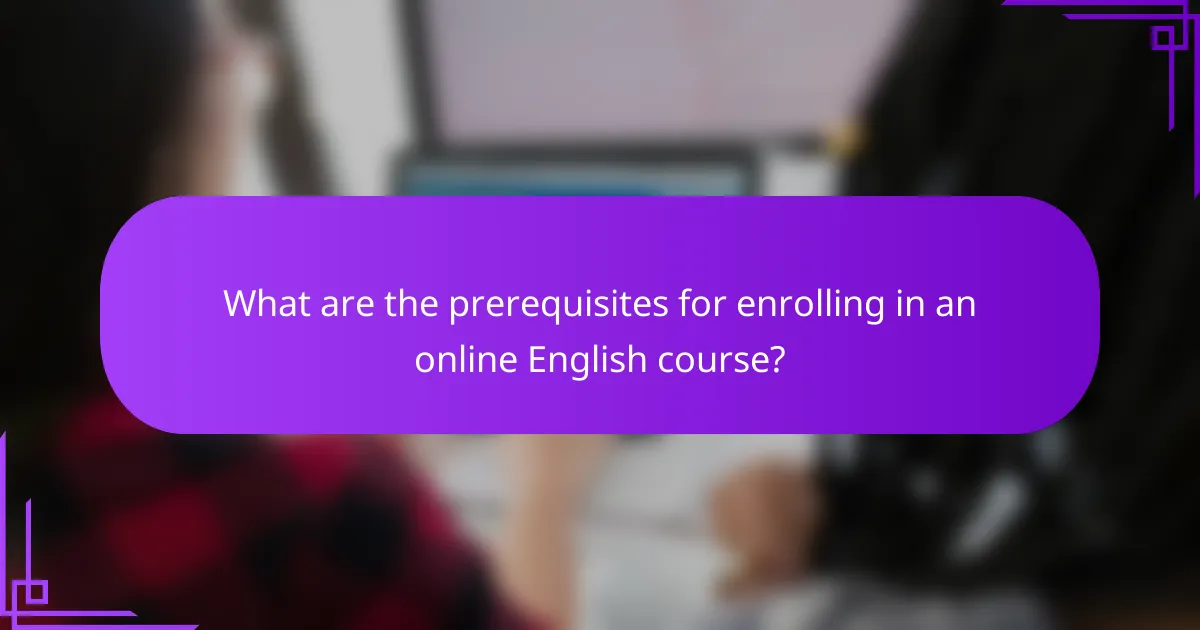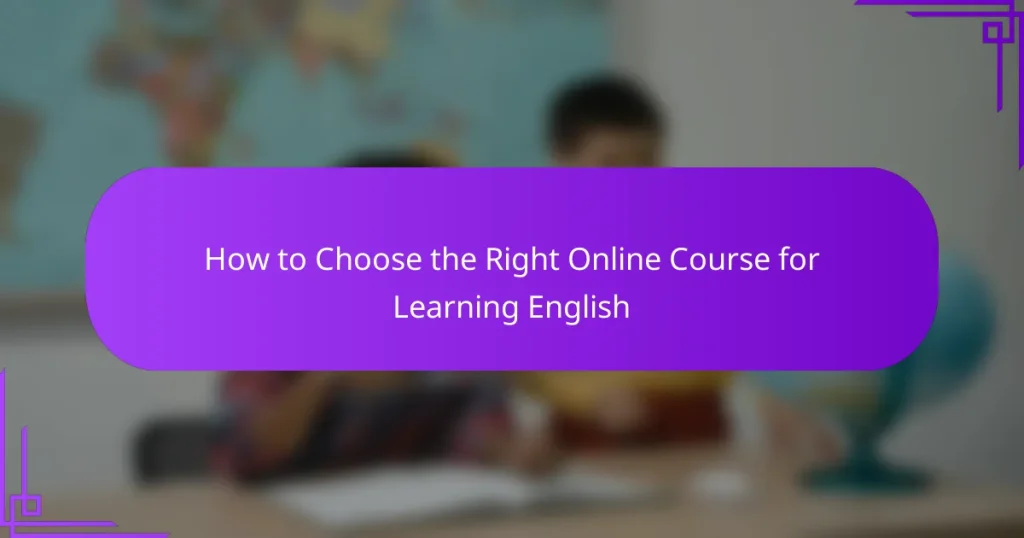Choosing the right online course for learning English is essential for achieving your language goals effectively. Consider factors such as your current skill level, learning style, and schedule, as well as the course’s format, cost, and duration. Additionally, evaluating the course’s accreditation, instructor qualifications, and student feedback can help you make an informed decision that aligns with your educational needs.

What are the best online courses for learning English?
The best online courses for learning English cater to various skill levels and learning goals. Popular options include platforms that offer structured lessons, interactive exercises, and opportunities for real-world practice.
Coursera English for Career Development
Coursera’s English for Career Development course is designed for non-native speakers looking to enhance their professional communication skills. It covers essential topics such as writing resumes, preparing for job interviews, and improving workplace interactions.
This course typically lasts a few weeks and allows learners to study at their own pace. It includes video lectures, quizzes, and peer-reviewed assignments, making it an engaging option for those focused on career advancement.
Udemy Complete English Course
Udemy’s Complete English Course offers a comprehensive curriculum that covers grammar, vocabulary, and pronunciation. It is suitable for beginners to advanced learners, providing a flexible learning experience with lifetime access to course materials.
Students can expect a mix of video lectures, practice exercises, and downloadable resources. The course often includes user reviews and ratings, helping potential learners gauge its effectiveness before enrolling.
EF English Live
EF English Live is an interactive platform that offers personalized English lessons with certified teachers. This course is ideal for those who prefer a more hands-on approach, as it includes live classes, group discussions, and one-on-one tutoring sessions.
With a subscription model, learners can access a wide range of materials and practice opportunities at any time. This flexibility is particularly beneficial for busy professionals or students balancing multiple commitments.

How do I assess the quality of an online English course?
To assess the quality of an online English course, consider its accreditation, instructor qualifications, and student feedback. These factors can help you determine if the course meets educational standards and aligns with your learning goals.
Accreditation and certifications
Accreditation ensures that an online English course meets specific educational standards. Look for courses accredited by recognized organizations, as this often indicates a commitment to quality and adherence to industry norms.
Certifications can also enhance the credibility of a course. For instance, courses that offer certificates from reputable institutions can be more valuable for your resume and professional development.
Instructor qualifications
The qualifications of instructors play a crucial role in the effectiveness of an online English course. Check if the instructors have relevant degrees, certifications, or extensive teaching experience in English language education.
Instructors with practical experience, such as teaching in diverse environments or using innovative teaching methods, can provide richer learning experiences. Look for courses that showcase instructor profiles to assess their expertise.
Student reviews and testimonials
Student reviews and testimonials provide insight into the real-world effectiveness of an online English course. Look for feedback on course content, teaching methods, and overall satisfaction from past students.
Consider checking independent review sites or forums to gather a range of opinions. A course with consistently positive reviews is often a good indicator of quality, while numerous negative comments may signal potential issues.

What factors should I consider when choosing an English course?
When selecting an English course, consider your learning style, goals, and schedule. Key factors include the course format, cost, duration, and workload to ensure the program aligns with your needs.
Course format (live vs. self-paced)
The course format significantly impacts your learning experience. Live courses offer real-time interaction with instructors and peers, which can enhance motivation and accountability. However, self-paced courses provide flexibility, allowing you to learn at your own speed, which can be beneficial for busy schedules.
Consider your personal learning preferences. If you thrive in structured environments, a live course may be ideal. Conversely, if you prefer to manage your own time, a self-paced option might suit you better.
Cost and payment options
Cost is a crucial factor when choosing an English course. Prices can range from free resources to several hundred dollars for comprehensive programs. Look for courses that offer transparent pricing and various payment options, such as one-time payments or installment plans.
Additionally, check if the course provides any financial aid or discounts. Some platforms offer scholarships or promotional rates, which can make quality education more accessible.
Course duration and workload
Course duration and workload are essential to understand before enrolling. Most English courses can last from a few weeks to several months, depending on the depth of content. Assess how much time you can realistically dedicate each week to studying.
Evaluate the expected workload, which may include assignments, quizzes, and interactive sessions. A course that requires more hours may lead to faster progress but could be overwhelming if you have other commitments. Aim for a balance that fits your lifestyle and learning goals.

How can I find an English course that fits my learning style?
To find an English course that suits your learning style, assess your preferences for how you absorb information. Consider whether you learn best through visual aids, listening, interaction, or traditional methods, as this will guide your course selection.
Visual vs. auditory learning preferences
Visual learners benefit from courses that incorporate images, videos, and written materials. Look for programs that use infographics, charts, and visual storytelling to enhance comprehension.
Auditory learners thrive on listening and speaking. Courses that include podcasts, audio lessons, and opportunities for conversation practice will be more effective for these individuals. Consider platforms that offer live discussions or recorded lectures.
Interactive vs. traditional teaching methods
Interactive courses often engage learners through activities, quizzes, and group projects, making the learning process more dynamic. These methods can enhance retention and motivation, especially for those who enjoy hands-on experiences.
Traditional teaching methods may include lectures and textbook-based learning. While these can provide a solid foundation, they may not cater to all learning styles. If you prefer structured lessons, look for courses that balance traditional content with some interactive elements.

What are the prerequisites for enrolling in an online English course?
Before enrolling in an online English course, it’s essential to have a basic understanding of the language and access to the necessary technology. These prerequisites ensure that you can effectively engage with the course content and participate in interactive learning activities.
Basic language proficiency
Having a foundational level of English proficiency is crucial for enrolling in most online courses. This typically means being able to understand simple sentences and communicate basic ideas. If you are a complete beginner, consider starting with introductory courses designed for learners with no prior experience.
Assess your current level using online placement tests or self-assessment tools. Many platforms offer these resources for free. Knowing your proficiency level helps you choose a course that matches your skills and learning goals.
Access to technology and internet
Reliable access to technology and a stable internet connection are vital for participating in online English courses. Most courses require a computer, tablet, or smartphone, along with a high-speed internet connection to stream videos and engage in live sessions.
Check if your device meets the technical requirements of the course platform. Some courses may require specific software or applications, so ensure your technology is up to date. If you have limited internet access, look for courses that offer downloadable materials or offline learning options.

What are the benefits of online English courses in major cities?
Online English courses offer significant advantages for learners in major cities, including convenience, accessibility, and a wide range of options tailored to different needs. These courses allow individuals to improve their language skills without the constraints of traditional classroom settings.
Flexible scheduling for busy professionals
Online English courses provide flexible scheduling that accommodates the hectic lives of busy professionals. Many programs offer asynchronous classes, allowing learners to study at their own pace and fit lessons around work commitments.
This flexibility means that professionals can choose to engage in short, focused sessions during breaks or longer study periods on weekends. As a result, they can effectively balance their language learning with their professional responsibilities.
Access to diverse learning communities
Enrolling in online English courses connects learners with diverse communities from around the world. This exposure to different cultures and perspectives enriches the learning experience and enhances conversational skills.
Many platforms feature discussion forums, group projects, and live sessions that foster interaction among students. Engaging with peers from various backgrounds can lead to a deeper understanding of language nuances and practical usage in real-world contexts.

What are the emerging trends in online English learning?
Emerging trends in online English learning focus on enhancing engagement and effectiveness through technology. Key developments include AI-driven personalized learning and gamification, which cater to individual learning styles and make the process more interactive.
AI-driven personalized learning
AI-driven personalized learning tailors educational experiences to individual needs by analyzing user data and adapting content accordingly. This approach allows learners to progress at their own pace, focusing on areas where they need the most improvement.
For instance, platforms may use algorithms to assess a learner’s strengths and weaknesses, suggesting specific exercises or resources to enhance their skills. This can lead to more efficient learning, as students spend less time on concepts they already understand.
Gamification in language learning
Gamification incorporates game-like elements into language learning to increase motivation and engagement. Features such as points, badges, and leaderboards encourage learners to participate actively and track their progress.
Many online courses now include interactive quizzes and challenges that reward users for completing tasks. This not only makes learning more enjoyable but also fosters a sense of community among learners, as they can compete or collaborate with peers.


